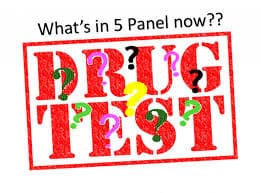Are you using the current DOT drug testing panel? It is still a 5-panel drug test? Have you updated your DOT drug & alcohol Policy?
DOT 5 Panel Urine Drug Test
As specified in DOT regulations 49 CFR part 40 with the Cut Off levels listed in DOT regulations 49 CFR part 40; the following substances will be tested for:
- Marijuana metabolites
- Cocaine metabolites
- Phencyclidine
- Opioids – codeine, heroin, morphine, oxycodone, oxymorphone, hydrocodone & hydromorphone
- Amphetamines -amphetamine, methamphetamine, MDMA & MDA
Some common names for the new semi-synthetic opioids include OxyContin®, Percodan®, Percocet®, Vicodin®, Lortab®, Norco®, Dilaudid®, and Exalgo®.
DOT Covered Employees and Opioids Testing
An essential DOT covered employee job duty is the ability to perform job functions in a constant state of alertness, and a safe manner. Prescribed use of the semi-synthetic opioids prescription drugs could render a DOT covered employee as medically unqualified under an applicable DOT agency regulation or is likely to pose a significant safety risk. This may trigger a reporting obligation by the MRO to your employer. DOT covered employees with prescriptions as listed in the section above (semi-synthetic opioids prescription drugs) should visit with their prescribing physician to determine if an alternative treatment or medication is available.
When a laboratory positive test is reversed due to a prescribed opioid, the Medical Review Officer (MRO) has been directed by DOT to first provide the employee with up to five business days after the reporting of the verified negative result to have the prescribing physician contact the MRO to determine if the medication(s) can be changed to one that does not make the employee medically unqualified or that does not pose a significant safety risk before reporting the safety concern.
DOT covered employees should make sure all prescriptions are up to date and current. Any prescriptions past their expiration date may not be accepted by the MRO as a valid current prescription and so may not constitute a valid medical excuse under DOT regulations.







